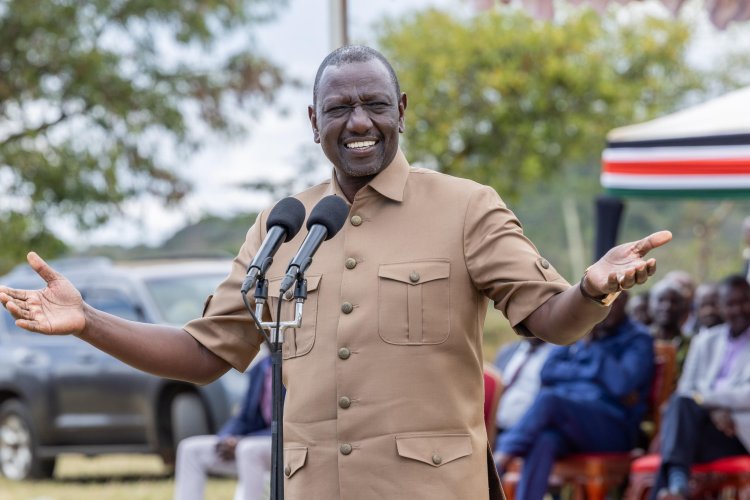Governors Reject Proposals In Ruto Education Reforms
CoG's Legal, Constitutional Affairs and Intergovernmental Relations and the Education Committee argued that the recommendations are unacceptable as they heavily claw back on Devolution.

The Council of Governors (CoG) has announced that it has rejected the recommendations of the Presidential Working Party of Education Reforms (PWPER).
In a statement to newsrooms on Wednesday, January 10 whose authenticity was confirmed by journalists who spoke to Viral Tea, CoG's Legal, Constitutional Affairs and Intergovernmental Relations and the Education Committee argued that the recommendations are unacceptable as they heavily claw back on Devolution.
"While we appreciate the efforts made by the Presidential Working Party towards the transformation of the education sector, the Council of Governors urges that further consultations must be undertaken to ensure that the perspectives and concerns of County Governments are adequately considered in the realization of the recommendations," read the statement in part.

CoG Chairperson Governor Anne Waiguru (centre) speaking during a press briefing at the CoG offices in Nairobi on Tuesday, May 2, 2023. /ANNE WAIGURU
"To this end, the recommendations of the Presidential Working Party are unacceptable to the Council they heavily claw back on Devolution."
CoG further stated that it categorically does not agree and rejects the recommendations in entirety to the extent that they undermine the basic structure and framework of the constitution
"The Council of Governors hereby withdraws its participation from any process that seeks to legislate the recommendations contained in the report. This includes the proposed meeting called by Inter-Governmental Relations Technical Committee scheduled for 16th January 2023," added the statement.
CoG also directed County Governments to continue to manage both the institutions and Human resources for the constitutionally assigned functions in Education.
A convening of any devolved sector forum will furthermore strictly be done between the two levels of government and no other entity.
Explaining the reason for their rejection of the recommendations, CoG faulted the establishment of a comprehensive school system where all levels of learning are headed by one head of institution without regard to delineated functions in the Constitution.
They indicated that there was no accountability framework provided for the proposed Head of Institutions to the Counties regarding the management of Pre-primary schools.
"The report also recommends that the Ministry of Education, Teachers Service Commission, and COG to develop an intergovernmental agreement for hiring and remuneration of pre-primary teachers.
"Further, the report recommends the amendment to the Basic Education Act to have the County commissioner as the County Education Board. This is a clear reverse gear to the gains of devolution noting that ECDE is a fully devolved function," added the statement.
According to CoG, hiring of pre-primary teachers is a preserve of the County Governments as reiterated in the judgment in the High Court ruling in the case of KNUT vs. The Attorney General and 4 others (2016) that clarified the powers of the County Governments in hiring pre-primary teachers.
"Framework for the facilitation of development partners who support education in the country. The Framework should allow the Ministry of Education to coordinate the partners supporting the National Education Function while the COG to coordinate partners supporting the devolved education function, among others," continued the statement.
On September 27, 2023, Members of Parliament (MP) stopped the implementation of the recommendations of the Presidential Working Party of Education Reforms (PWPER).
Speaking during a session in the National Assembly, Speaker Moses Wetangula declared that it was unlawful for recommendations to be implemented before passing through Parliament.
Among other recommendations, PWPER recommended that the Competency Based Curriculum (CBC) be implemented but with modifications to achieve the desired objectives.
“Findings show that CBC is good for the country; it has great potential to lay a strong foundation for relevant human capital development, which is required for societal transformation and sustainable development,” the report by PWPER released on Tuesday, August 1, 2023 read in part.

President Ruto receiving a report from the Presidential Working Party on Education Reforms on August 1, 2023. /PCS
The team led by Prof Raphael Munavu also proposed for the Kenya Institute of Curriculum Development (KICD) to alter the learning areas so that they don't exceed five in pre-primary, not more than seven in lower primary and not to exceed eight in upper primary. In Junior Secondary and Senior School, PWPER recommended nine and seven units to be taught respectively.
The task force also recommended that the Ministry of Education do away with the categorization of public secondary schools from the current nomenclature (national, extra-county, county, and sub-county) to career pathways (STEM, social science, and arts and sports science).
The task force also recommended that the computation of the Kenya Certificate of Secondary Education (KCSE) mean score by the Kenya National Examinations Council (KNEC) be based on Mathematics, English or Kiswahili, and five other best-performed subjects.

 admin
admin 




